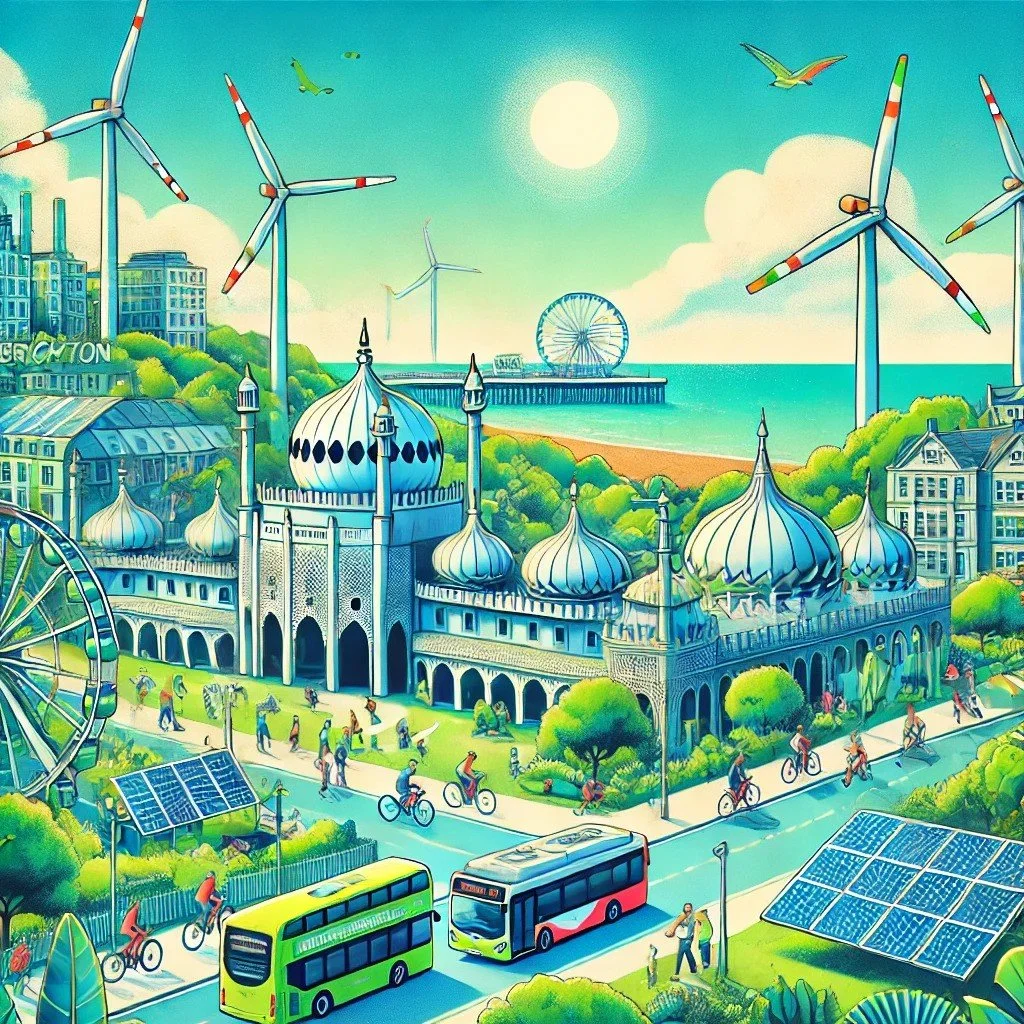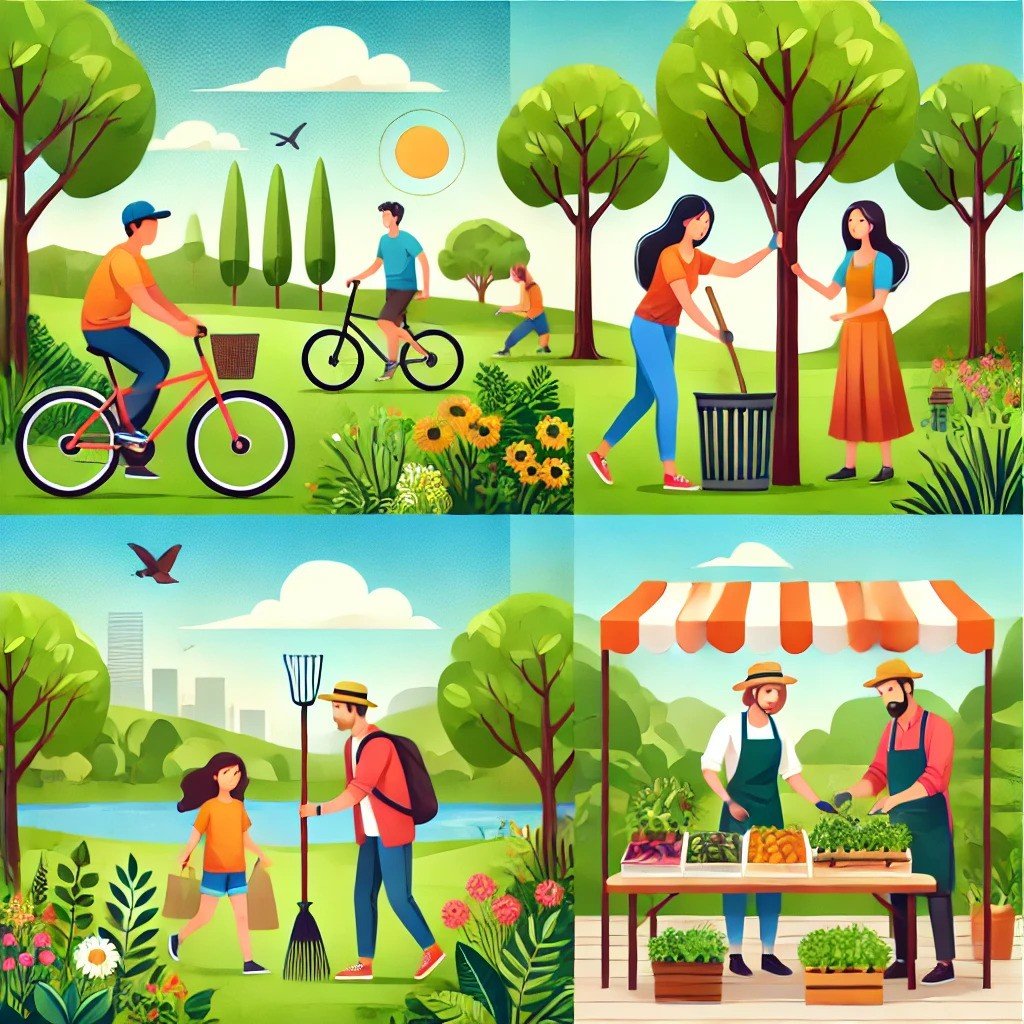
Climate:change A green beacon conference meeting thoughts
How Is Green Growth Possible, and Is Growth Necessarily the Answer?
At the recent Climate:Change event, A Green Beacon, experts from diverse industries highlighted that Brighton and Hove’s current development model is unsustainable and unlikely to improve both residents’ quality of life and the city’s environment.
Despite ambitious targets to build 250,000 new homes and double the local economy within 15 years, speakers like Dirk Willem Te Velde (ODI) and Sambit Bhattacharyya (University of Sussex) emphasized the need for a transition rather than unchecked growth. Dirk shared insights from international case studies where economies successfully transitioned by focusing on key sectors and fostering resilient, collaborative networks. Sambit stressed that growth alone is insufficient without diversity and sustainable productivity within the economy.
Councillor Jacob Taylor candidly acknowledged that past economic growth efforts have been “okay” at best, and rarely aligned with environmental or sustainability goals. He advocated for a shift away from consumer-driven, low-value economic models towards one that enables people to thrive in meaningful, value-adding roles. While issues like gender pay gaps and low wages were raised, data sources were lacking, though the systemic disadvantage women face remains undeniable.
Audience feedback revealed widespread frustration over inadequate sustainable planning, slow progress in transitioning the economy, limited funding for essential services, insufficient public transport improvements, and poor engagement between authorities and residents. Concerns also included low retention of educated professionals, lack of well-paid, sector-specific jobs, underinvestment in community spaces, limited support for small businesses driving sustainability (such as Toji), and escalating housing costs that threaten to displace young professionals.
The idea of devolution emerged as a hopeful solution amid ongoing capitalist pressures. With declining birth rates, rising education levels, and unaffordable housing, expecting continuous growth under a fixed market is unrealistic. Dirk emphasized that intentional market intervention by councils and business leaders is crucial. Redirecting funds from new developments to upgrading existing infrastructure can foster a healthier, less stressed population more capable of supporting sustainable transition efforts. Though funding from the SR25 settlement is limited, capital could be raised through taxation on existing national wealth—a strategy proven in Nordic and European countries to improve living standards, public services, and reduce inequality.
Investment shortfalls in Brighton’s predominantly small and micro-business sector (91% of local businesses) are unsurprising. These businesses often lack funds to invest in environmental initiatives, despite the strong return on investment such measures typically offer through improved efficiency and emissions reduction. Increasing demand for renewable energy among residents and businesses will, however, pressure energy providers to modernize a grid currently lagging behind European peers.

Brighton & Hove’s 2030 Net-Zero Goals: Progress, Challenges, and the Path Forward
Brighton & Hove has set an ambitious goal to become a carbon-neutral city by 2030, showcasing its commitment to sustainability and climate action. Through its Carbon Neutral 2030 Programme, the city is actively working to reduce emissions, improve energy efficiency, and engage the community in environmental initiatives. In this blog post, we explore the progress made, the challenges ahead, and the future plans shaping Brighton & Hove’s path to net zero.

What Can I do for MY local environment?
Discover easy ways to make a positive impact on your local environment. Reduce waste, support green businesses, conserve energy, and more! Read now for practical eco-friendly tips.

Running Duck Winery: A Sustainable Sip Worth Savouring
When we think about wine, we often picture rolling vineyards, sunshine, and perhaps the occasional wine-tasting trip. But behind the scenes, the wine industry can have a significant environmental impact—from water use and carbon emissions to chemical treatments on the vines. That’s where Running Duck Winery stands apart.
This South African winery, named after the Indian runner ducks that play a vital role in their vineyards, takes eco-friendly wine production to the next level. By blending age-old farming techniques with innovative sustainability practices, Running Duck is crafting wine that’s as kind to the planet as it is to your palate.

Carbon Footprint 101: A Beginner’s Guide for Small Businesses
I am a driven Environmental Science graduate with hands-on experience in sustainability consulting, project management, and stakeholder engagement. Passionate about driving the net zero transition, I excel at translating complex research into actionable strategies that deliver measurable impact.

B Corp Made Simple: Why Your Business Needs This Badge
Looking to take your business to the next level while making a positive impact? 🌍 B Corp certification is your badge of honor for balancing purpose and profit. Discover what it takes to join this global movement and why it’s a game-changer for businesses of all sizes.

guilt-free christmas gifting - how to celebrate sustainably
This holiday season, you can give gifts that spread joy while caring for the planet. From choosing sustainable brands to gifting experiences over things, there are countless ways to celebrate sustainably. Whether it's a homemade creation or a secondhand treasure, every thoughtful gift helps reduce waste and environmental impact. By making mindful choices this Christmas, you can create lasting memories without the guilt.

Sustainable Packaging: A Guide for Businesses in the UK
As businesses increasingly recognize the importance of sustainability, packaging is emerging as a critical focus area. Sustainable packaging is not just a trend; it's a necessity in today's environmentally conscious market. In the UK, companies are exploring innovative ways to minimize their environmental impact while still delivering high-quality products to consumers. In this post, we’ll delve into sustainable packaging in the UK, highlighting examples, ideas, and suitable materials for food packaging.

Understanding ISO 14001 Requirements: A Guide for Businesses
ISO 14001 requirements are essential for businesses looking to improve their environmental impact and achieve certification. This guide breaks down the key elements, including ISO 14001 training and the benefits of displaying the ISO 14001 logo. Learn how to implement an effective Environmental Management System (EMS) and position your business for sustainable success.

Top 5 Ways to Decarbonize Your Business and Boost Sustainability
As businesses around the world face increasing pressure to reduce their environmental impact, decarbonization has become a key priority. At Toji Consulting, we help companies take actionable steps to reduce their carbon footprint and achieve sustainability certifications like ISO 14001. Here are the top 5 ways to decarbonize your business and create a more sustainable future.

Why Achieving B Corp Certification Is a Game-Changer for Sustainable Businesses
Discover how B Corp certification can transform your business by attracting customers, engaging top talent, and boosting your brand reputation. Learn how Toji Consulting can guide you through the process to achieve this prestigious certification. Get started today!
